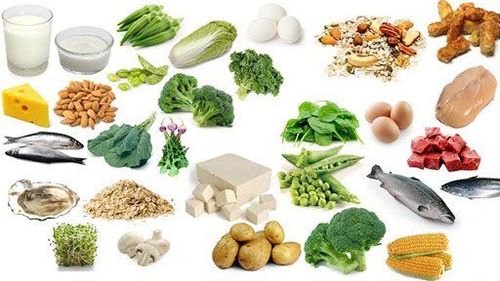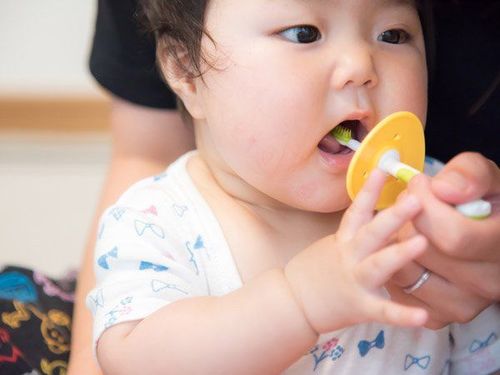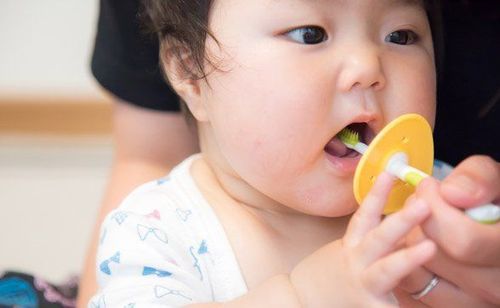This is an automatically translated article.
The article was professionally consulted by Master, Doctor Doan Ngoc Quynh Tram - Department of Pediatrics - Neonatology - Vinmec Nha Trang International General Hospital.What an 8-month-old baby can eat always makes parents interested and learn because at this time the nutritional needs of an 8-month-old baby have increased significantly. Therefore, the mother needs to develop a suitable nutrition regimen, a scientific weaning schedule, and at the same time do not forget to take care of and protect the oral health of the 8-month-old baby.
1. Nutrition for 8 month old baby
An 8-month-old baby still needs breast milk every day. Along with breast milk, from 6 months of age, babies are introduced to solid foods to help form later eating skills and help them develop comprehensively by providing more nutrients through foods.
Bé 8 tháng tuổi vẫn cần được duy trì sữa mẹ mỗi ngày
1.1 Necessary nutrition for 8 months old baby
The nutritional needs of an 8-month-old baby begin to increase, so babies need to eat solid foods from 2-3 meals/day. At this time, weaning is considered the main meal of the child. In addition, children can eat extra meals to support the supply of other essential nutrients.Nutrition for an 8-month-old baby needs to ensure to provide about 500ml of milk/day and 200ml/meal, 2-3 meals a day of powder or porridge. In meals, the following groups of substances are needed:
Starch: It is necessary to provide children with 50 - 60g of starch (mainly from rice) per day. Protein: An 8-month-old baby can eat a variety of foods that provide protein. Every day children need about 50 - 60g of beef, lean pork, shrimp, fish, ... Vitamins and minerals: At this stage, children need to be supplemented with a relatively large amount of green vegetables and fruits to ensure ensure fiber as well as essential vitamins and minerals such as vitamins A, C, ... to help children stay healthy and develop comprehensively. Fat: In addition to the main groups of substances mentioned above, an 8-month-old baby also needs about 10-15g of fat from cooking oil or vegetable fat per day.

Nhu cầu dinh dưỡng cho em bé 8 tháng tuổi cần đảm bảo cung cấp đẩy đủ các chất
1.2 What can 8-month-old babies eat?
What an 8-month-old baby can eat is no longer a difficult problem for parents because at this stage the child can eat a wider variety of foods. However, when preparing baby food, mothers also need to pay attention to crushing or pureeing so that the baby's digestive system is easier to absorb. Mothers also need to ensure a balance of 4 main groups of substances: starch, protein, vitamins, minerals and fat for children. Specifically, an 8-month-old baby can already eat the following processed foods:Starch: Rice cooked into porridge, soft cooked noodles, cereals such as green beans, ... Protein: pork , beef, pureed or minced chicken, shrimp, crab, fish, eggs, ... Vitamins and minerals: group of fruits such as apple, papaya, banana, watermelon, melon, peach, strawberry, orange, kiwi, ... crushed or sliced; group of vegetables such as collard greens, squash, moringa, cauliflower, carrots, tomatoes, pumpkin, mushrooms, asparagus, ... are minced or mashed. Fat: olive oil, sesame oil, dairy products help provide fat such as cheese, whey, yogurt, ...
1.3 Notes when feeding an 8-month-old baby with solid foods
When feeding an 8-month-old baby, mothers should note the following information:Weaning for children from 8 months old is very important because the nutritional needs of children are increasing day by day. When children need to eat solid foods from 2-3 meals/day, mothers should establish a scientific and reasonable eating schedule for breakfast, lunch and dinner so that children can get used to mealtimes. The menu should be varied and flexible to help children get used to many different flavors and foods, and at the same time stimulate their eating. When an 8-month-old baby eats 2-3 meals a day, the mother should cook each meal so that the food is nutritious when it has just been cooked, avoiding reheating a dish many times will reduce the nutrients in the food. Although the nutritional needs of children increase, but also avoid forcing children to eat because it can cause psychological anorexia in children. When cooking porridge for children, the mother can use bone broth to increase the aroma and flavor of the dish, but it is necessary to give the child both meat and water to ensure that the child is provided with adequate nutrients. The mother should gradually increase the consistency of the food for the 8-month-old baby. Limit too salty taste in children's dishes and avoid abuse of buying porridge from outside for children to eat.
2. Dental care for 8 months old baby
Children's chewing and swallowing skills improve day by day when they start eating solids. Therefore, mothers need to continue to support the 8-month-old baby to form and develop the chewing-swallowing reflex by gradually increasing the consistency of processed foods, from dilute at 6 months old, to gradually thickening or thickening powder. , pureed porridge at 7-8 months old and 12-month-old children can eat whole grain porridge, or soft-cooked vermicelli, noodles, and pho.In addition, to stimulate the child's chewing - swallowing reflex, the mother needs to avoid giving the child pureed food for a long time. Your 8-month-old baby can now have a few teeth, but he can still use his gums to crush food before using his teeth. Therefore, in addition to increasing the consistency, the mother should also let the child get used to the skills of chewing - swallowing and grasping food by processing foods with the shape of long sticks and sticks. Chewing, swallowing food will help children secrete fluid in the mouth to feel the taste of food better.
Since the baby's first tooth erupts and enters the weaning journey, the mother needs to pay attention to proper oral hygiene for the child. After finishing each meal, the mother can give the child some water to help them clean their teeth.
It is necessary to practice and maintain the habit of drinking water from a cup for 8-month-old babies and limit the use of straws or bottles to drink water to avoid affecting the development of the child's teeth.
Nutrition and dental care for an 8-month-old baby is very important because at this time, the nutritional needs of the baby increase. Children need to eat 2-3 meals a day and a variety of foods to provide more nutrients, help children healthy and comprehensive development.

Từ khi trẻ mọc chiếc răng đầu tiên và bước vào hành trình ăn dặm, cần chú ý giữ gìn vệ sinh răng miệng cho trẻ đúng cách
If you have a need for medical examination with experienced pediatricians at Vinmec, please book an appointment on the website to be served.
In addition, parents should also apply some methods of changing habits and improving nutrition to support the child's teeth to develop better.
Besides, parents also need to supplement their children with essential micro-minerals such as zinc, lysine, chromium, selenium, vitamin B1, ... to fully meet the nutritional needs of children. The addition of these essential vitamins also supports digestion, enhances nutrient absorption, improves anorexia, and helps children eat well. Parents can simultaneously apply dietary supplements and functional foods derived from nature for easy absorption. The most important thing is that improving your baby's symptoms often takes a long time. The combination of many types of functional foods at the same time or continuously changing many types in a short time can cause the baby's digestive system not to adapt and completely not good. Therefore, parents must be really patient with their children and regularly visit the website vimec.com to update useful baby care information.














